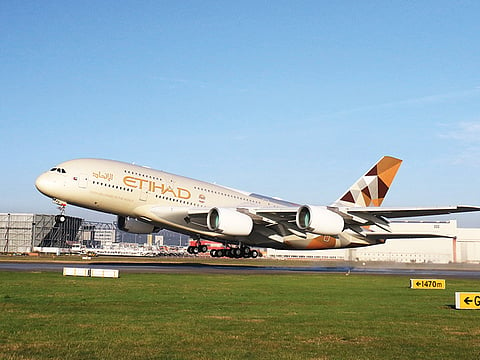Etihad Airways reports $1.52b in losses for 2017
Airline posts marginal improvement on 2016 performance amid strategy review

Dubai: Etihad Airways on Thursday reported $1.52 billion (Dh5.5 billion) in losses for 2017, marking the airline’s second consecutive year of losses as it continues to grapple with finances following sour investments.
The figure is an improvement from the 2016 loss of $1.95 billion, which Etihad restated from the previously disclosed $1.87 billion. The 20 per cent reduction in losses in 2017 came as Etihad slashed costs and as it undergoes a strategy review attempting to turn around performance.
In a statement, the Abu Dhabi-based carrier said that it reduced administration and general expenses by 14 per cent over 2016, and that it cut unit costs by 7.3 per cent. This was despite the adverse impact valued at $337 million from higher fuel costs.
The carrier also reduced its aircraft fleet to 115 planes in 2017 from 119 the year before.
Revenues in 2017 inched up to $6.1 billion, compared to $5.9 billion a year earlier, as total passengers carried by the airline rose marginally to 18.6 million from 18.5 million in 2016.
“The board, new executive leadership team, and all our employees worked extremely hard to navigate the challenges we faced. We made significant progress in driving improved performance and we are on track in 2018,” said Mohammad Mubarak Al Mazroui, chairman of the board of Etihad Aviation Group.
Meanwhile, Tony Douglas, chief executive officer of Etihad Aviation Group, who took on the role in January 2018, said the airline has made “good progress” in improving the quality of its revenues, streamlining cost base, improving cash flow and strengthening its balance sheet.
“These are solid first steps in an ongoing journey to transform this business into one that is positioned for financially sustainable growth over the long term,” he said in a statement.
The figures reported for 2017 are for core airline operations and do not include other units under the parent company, Etihad Aviation Group. The results also do not include profit or loss from investments such as those in Alitalia or Airberlin, Gulf News understands, though passenger numbers reported on Thursday include those carried via codeshares.
Further challenges ahead
John Strickland, director of air transport consultancy JLS Consulting, said he expected more challenges ahead of Etihad as the airline is still in the midst of tackling problems stemming from the losses incurred on its former partners Airberlin and Alitalia. Both of these European carriers have filed for administration.
“[Etihad] has also had to make significant cuts to its own fleet and network, and I would expect that further challenges will be faced as the airline seeks to reach a position of stability from where it is able to deliver future profitability,” Strickland said.
Etihad did not elaborate on when it expects to return to profitability, but Gulf News understands based on conversations with senior Etihad executives that the carrier may continue to record losses in 2018 as its turnaround strategy is a multi-year one.
On top of Etihad’s losses and strategy review, the carrier will face another key challenge this year as fuel costs continue to rise. At an International Air Transport Association (Iata) conference last week, analysts and executives from airlines around the world cited rising fuel prices as one the biggest challenges for the industry this year.
For Etihad, the carrier still has some fuel hedges in place, and Gulf News understands Etihad may bring back fuel surcharges in its ticket pricing.
Operational performance
From an operational perspective, Etihad received 12 new aircraft in 2017 to replace 16 older Airbus aircraft as the airline reduced its total fleet. Etihad also axed some routes including Dallas/Fort Worth, San Francisco, Tehran, Venice, Jaipur, and Entebbe as it seeks to move away from unprofitable activity.
In terms of freight, Etihad Cargo reduced capacity by 6 per cent, carrying 552,000 tonnes of cargo in 2017. Freight revenues fell 0.8 per cent year-on-year as load factors remained strong, the carrier said.



